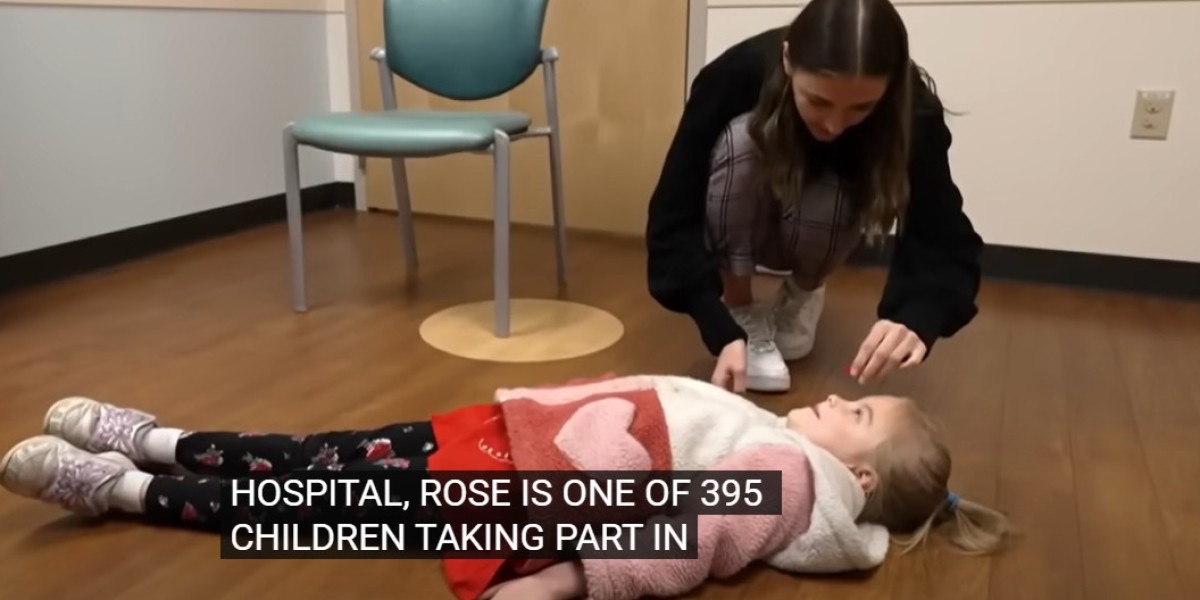A MUM is warning other parents to look out for the signs of Strep A after she nearly lost her daughter to complications caused by the illness.
Little Reign Passey came down with chickenpox on July 4, and at first, her mum Leanne said she appeared to be fine.
However, in days the little girl had to have a life-saving operation and has now been left with a large scar after medics had to remove flesh-eating bacteria in order to save her life.
Three days after the chickenpox developed, mum Leanne noticed her four-year-old had a temperature and appeared to be low on energy - symptoms of Strep A.
Chickenpox and Strep A are not the same illness, chickenpox is a viral infection caused by the varicella-zoster virus, and Strep is a bacterial infection.
Speaking to The Sun, Dr Rachel Ward, practising GP at Woodlands Medical Centre in Didcot, previously said that a child that has recently had chickenpox would be more at risk of Strep A due to their weakened immune system.
"Having chickenpox or recent chickenpox is a risk factor for developing invasive Strep A infection due the impact on the immune system of the chickenpox virus and possible skin infection via the spots," she said.
The UK has experienced a high level of Strep A cases since September 2022, with 36 children having died from the illness.
In most cases, Strep A bacteria causes mild illnesses, including strep throat, tonsillitis, impetigo and is also responsible for scarlet fever, as well as in rare cases, invasive Group Strep A disease which can prove deadly.
These bacteria may cause sepsis, which is the body's often deadly response to infection, the Sepsis Alliance states.
Leanne also spotted a red ring around one of the sores - and decided to take her daughter to a doctor.
It was recommended that they go to AE, but when the family arrived at their local hospital in Dudley, the West Midlands, Leanne claims she was given antibiotics and sent home, due to the fact her daughter was contagious.
However, Leanne, who works as an aesthetic practitioner, refused to leave, but was later told there were no beds available and that medics would not be able to treat her daughter, she claimed.
Leanne said: "By this point the red ring had almost tripled in size. They were adamant they were too busy, she was too contagious and I needed to take her home.
"I said the only way I was leaving was if they kicked me out - she was deteriorating by the second.
"They came back again and said there's no beds. I was crying at this point. I said, 'My child is really poorly and you're dismissing her'.
"Everyone I spoke to says they would have left and took her home - but I said, 'No she needs to be seen, there's no way I'm leaving."
Leanne then decided to take Reign to Birmingham Children's Hospital, where they presented at AE at 9.30pm.
The signs of Strep A and necrotising fasciitis you must know
There are four key signs of Group Strep A to watch out for, according to the NHS. These are:
A fever (meaning a high temperature above 38°C)
Severe muscle aches
Localised muscle tenderness
Redness at the site of a wound
The invasive version of the disease happens when the bacteria break through the body's immune defences.
This can happen if you're already feeling unwell or have an immune system that’s weakened.
In rare cases, Strep A can develop into sepsis.
The NHS states that Necrotising fasciitis is a flesh-eating disease.
Guidance states that it’s a rare infection that can happen if a wound gets infected and needs to be treated in hospital straight away.
The first signs of the illness are:
intense pain or loss of feeling near to a cut or wound – the pain may seem much worse than you would usually expect from a cut or wound
swelling of the skin around the affected area
flu-like symptoms, such as a high temperature, headache and tiredness
Later symptoms may include:
being sick (vomiting) and diarrhoea
confusion
black, purple or grey blotches and blisters on the skin (these may be less obvious on black or brown skin)
You should go to AE if you have a cut or which is more painful than expected.
The NHS states you also need emergency care if you have a cut or wound and get symptoms like a high temperature, headache, tiredness and muscle aches.
If you have sudden confusion or if you have black, purple or grey blotches or blisters near a cut or wound you should go to AE or call 999.
But because Reign was contagious, they were told to wait outside. Leanne said they were given a chair and were forced to wait until 3.30am.
She was finally seen at 8.30am and Leanne added that between those times her daughter's temperature had gone to almost 42C.
"She was hallucinating and talking to me. She'd gone past the point of screaming and was lying there almost lifeless.
"I picked her up and carried her through the doors and said someone needs to see my daughter, I feel like she's dying.
"[The doctors] thought she might have necrotising fasciitis as there was a black mark around the red ring.
"I'd gone from a child with chickenpox to her needing to go in for major op - I was screaming and I thought there's a chance she was going to die."
Leanne had the chance to briefly give her daughter a kiss and a cuddle before she was sent into theatre for four hours.
Following the agonising wait, the surgeon came to update them on the surgery.
They said they'd had to make a large cut into her side to cut away the necrotising fasciitis.
Reign was taken to intensive care, put in an induced coma to manage the pain and given breathing support.
Leanne said: "They had to leave her wound open because of how fast it spreads.
"They have to go back into the site and clean it however many times to make sure it's gone.
"The surgeon said they would come back after 24 hours and take her back down [to theatre].
"But because her obs [nursing observations] were okay, they left it for 48 hours - by this time we'd noticed she didn't look right.
"Her face and body were swollen, she didn't look right at all.
"We walked her to theatre and the surgeon explained it had spread and she was in septicaemia - we didn't know if she was going to survive."
IN RECOVERY
Leanne says doctors then started Reign on "ridiculous amounts of antibiotics" and she recovered.
Then the youngster also had to have a skin graft on her side and was moved to the burns ward to recover.
Reign spent three weeks in hospital recovering before being discharged.
Despite being left with a large scar on her side, Leanne says her daughter has recovered well - and likes to tell people she got her scar from "winning a fight against a crocodile".
A spokesperson for Birmingham Women's and Children's NHS Foundation Trust said: "When a child arrives at our Emergency Department with an infectious condition, such as chicken pox, steps are taken to move them to a side room or cubicle to safely isolate them from other patients.
"However, in times of very high demand when we are unable to offer this immediately, we identify somewhere for patients to wait away from the waiting room to minimise the risk of infection to other vulnerable patients.
"This is only done when considered safe following an assessment with a clinical professional and we communicate with families that should they have any concerns to notify a member of the clinical team immediately.
"It was an exceptionally busy summer period, all children were triaged by a member of our team very shortly after arrival and would be seen on a number of occasions by clinical professionals in the time before a cubicle became available."
They added that chicken pox is a very common childhood illness that in most cases will last five to seven days.
"In some cases, the skin can get infected, a sign of this could be a high fever after day five, in that situation parents are urged to see a doctor at their GP or Walk In Centre who can prescribe antibiotics to help.
"In some extremely rare cases the infection can be more serious and cause Necrotising Fasciitis, which can be caused by Streptococcal A, which would be treated at the hospital.
"We hope that Reign is doing well in her recovery," they said.
A spokesperson for Malling Health, which operates the Dudley Urgent Care Centre said: "We are sorry to hear about the experience recently shared with us.
"We are unable to comment on the specific details of the services provided due to patient confidentiality.
"We are proud of the standards of care provided at our centres and we continue to work tirelessly and collaboratively with local NHS partners to ensure all patients are being provided with safe and high-quality care and support."

















